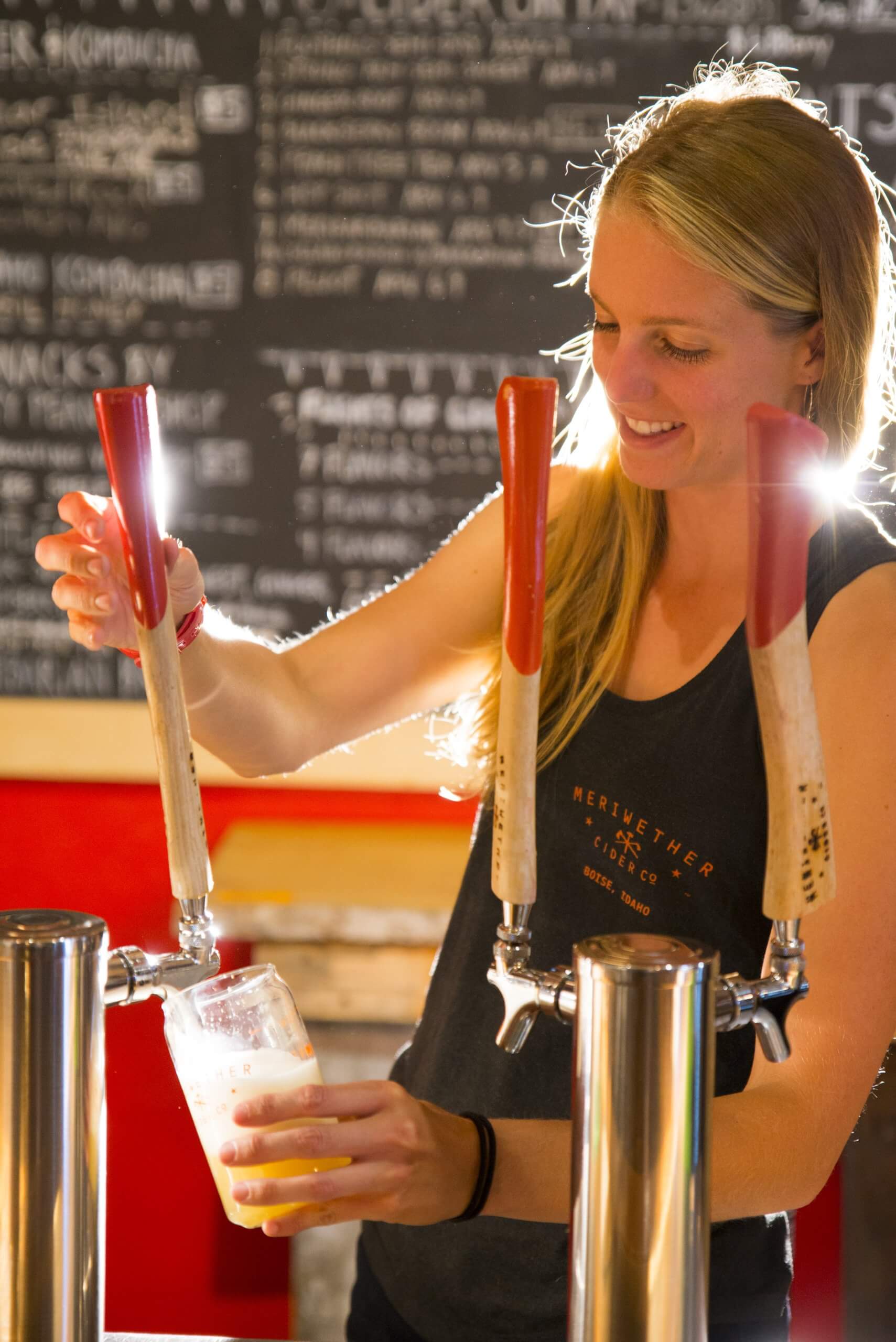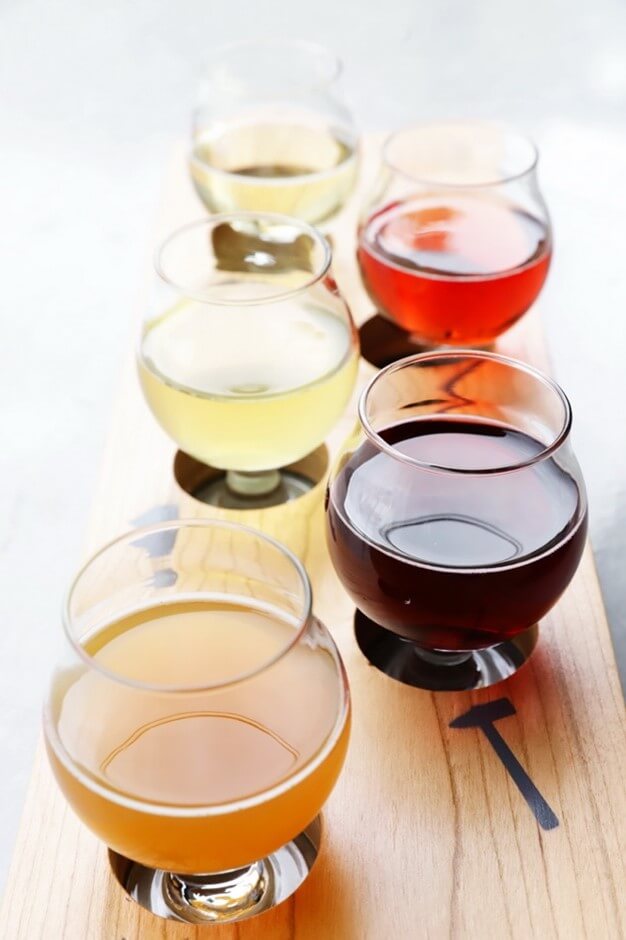Ask Molly Leadbetter about the biggest challenge of becoming Idaho’s first pommelier, and she’ll jokingly tell you: “People knowing how to pronounce it.”
She may be kidding, but many are unfamiliar with the French word for the cider industry’s equivalent of a wine sommelier, let alone its pronunciation. For the record, it’s pawm-all-e-ay, and it describes someone who comprehensively understands the intricacies and complexities of hard cider—the adult beverage made from the fermented juice of pome fruits: apples, pears and quince.
Leadbetter co-owns Meriwether Cider Company in Boise—Idaho’s longest-running cidery—with her parents and sister. In January 2024, she passed the American Cider Association’s (ACA) Certified Pommelier exam, joining an esteemed list of just over a hundred individuals worldwide. Her achievement reflects a deep commitment to her business and the elevation of Idaho cider nationally. “I want Idaho cider to be taken seriously on the national stage and having great cider—which we do—and educated folks in the industry makes all the difference,” she announces.

The Path to Certification
Meriwether started operations in 2015, so Leadbetter was already well-versed in cider. However, the desire to deepen her knowledge and lead by example in Idaho’s burgeoning cider industry pushed her to pursue the pommelier certification. “I’ve been a Level 1 Certified Cider Guide through the ACA for a long time now and knew I wanted to continue my education journey,” she explains. “I figured it was my responsibility to lead the way in becoming the first certified pommelier in the state, with hopes that my fellow cider folks will follow suit.”
Becoming a pommelier is no simple feat. The certification process is grueling and requires both theoretical knowledge and sensory analysis skills. “The certification is a 3-hour written test consisting of short answer and essay questions ranging from orcharding all the way through production and pairing with food. Then there is a 2-hour sensory analysis section where you blind-test ciders to identify tannins, acids, sweetness, aromas and flavor characteristics.”
The sensory analysis portion was particularly challenging. “It’s a process to train your palate and learn what you’re looking for,” she admits. “The ACA does a great job at hosting sensory analysis training sessions over Zoom that help a ton, but it really is just doing a lot of tasting and smelling to get ready for it.”

The certification process enriched Leadbetter’s understanding and appreciation of cider and pome fruits. “I definitely learned things about apples and pears that I didn’t know before,” she confesses. “Did you know there are over 7,500 named apple varieties? Apples have long been my favorite fruit, and I got a deeper appreciation for their history, varieties and flavor profiles during my studies, for sure.”
The program also introduced her to new fermentation techniques, such as crafting ice cider—made by extracting the juice from frozen apples, producing a sweeter beverage with a higher alcohol content—something she and her team are currently experimenting with. This continuous learning and innovation are central to ensuring that Meriwether remains at the forefront of the industry.
The Art of Cider Tasting
Through the process, Leadbetter honed her ability to discern the subtlest nuances in cider—a skill that transforms the tasting experience into a true art form. Her approach to tasting and evaluating cider is meticulous, reflecting the expertise and attention to detail required of a pommelier. “First, you look at the color. Is it opaque or clear? What color is it? Then you smell it. What aromas are you pulling from the cider? How strong is the aroma? What are the primary and secondary smells? Then you finally sip it, swish it in your mouth and spit it out. Did the tannins dry your mouth out? How sweet is it? Is it sparkling? How much acid? What flavor profiles are you pulling from it—pineapple, woody, mineral?”

When asked about the qualities that set a truly exceptional cider apart from an average one, Leadbetter admits it’s a complex question that cider professionals could debate endlessly. “Some people would argue that using heirloom apples that have distinct tannins to make the cider deeper and more complex makes it a higher quality, but I don’t think that tells the whole story,” she says. “Sometimes you just want a light bright cider that drinks easy and you can quaff while sitting in the park with friends.”
In her view, the hallmarks of quality lie in using “whole, real ingredients”—no artificial flavors, colorings or stabilizers and not a lot of added sugars. That’s why she prioritizes “making something that anyone looking at your ingredients label would be happy to buy.”
Cider Recommendations for Every Palate
For those new to cider, Leadbetter’s recommendations are tailored and thoughtful. “I ask what they normally drink. If they’re a beer drinker, I typically have them taste our Hop Shot, which is a semi-dry, dry-hopped cider with cascade and citra hops. If they are a white wine drinker, I introduce them to our Foothills Semi-Dry, which has a lot of similarities to prosecco—bright, bubbly, light and crisp. For red wine drinkers, I recommend our Black Currant Crush, which is a deep, rich, full-bodied semi-sweet cider that gives you that same feeling of fullness and fruitiness.”

The Growing Popularity of Cider in Idaho
Over the years, Leadbetter has witnessed a significant evolution in the awareness and understanding of cider in Idaho. “In the eight years Meriwether has been around, the amount of cider on tap at restaurants and bars has grown exponentially, and more and more people are reaching for cider because it’s a great product with lots of fun varieties and delicious options,” she informs.
Leadbetter is optimistic about the future of cider in Idaho, anticipating continued growth and the emergence of more cideries. “I don’t think cider in Idaho has nearly reached its peak. I think it’s going to keep getting bigger and bigger. Hopefully, we’ll see a couple more cideries pop up all over the state!”
If you’re looking to sample some cider, head to Meriwether’s Cider House in Boise or its taproom in Garden City, where you’ll find an impressive variety of mouthwatering cider options. Leadbetter recommends ordering a flight—where you choose your five preferred ciders to sample—to explore different flavors and find personal preferences. Just be sure to mention that you heard about it from the Certified Pommelier.
Feature image credited to Meriwether Cider Company.
Published on June 25, 2024
